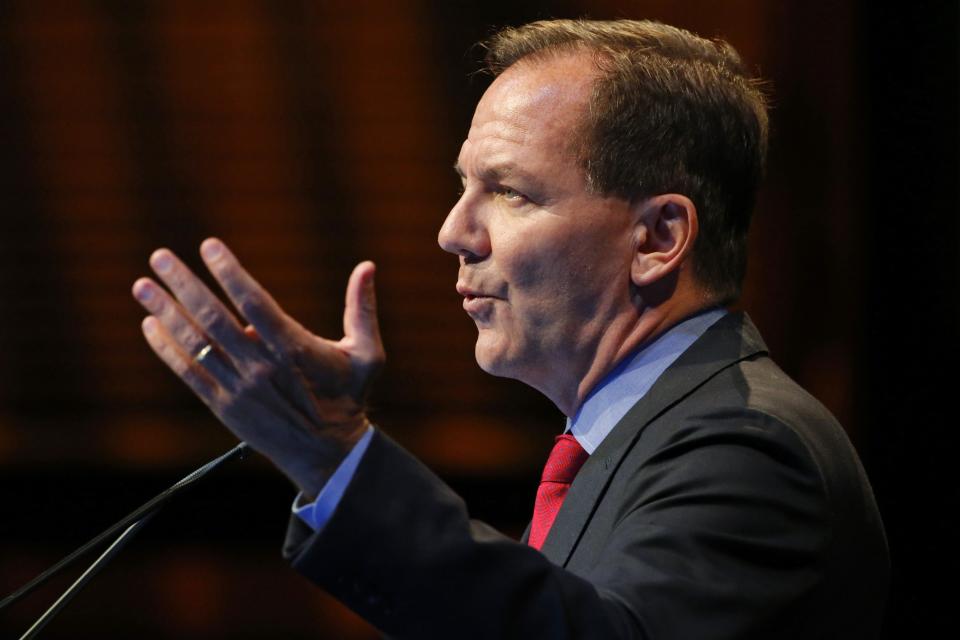Wall Street's services are in the discount bin
Fees are falling across Wall Street.
On Tuesday morning, Fidelity Investments announced it’s lowering online commissions for trading U.S. stock and ETFs to $4.95 from $7.95, a 37% decrease. Fidelity retail brokerage president Ram Subramaniam called this “a bold move” in an interview with Yahoo Finance.
Shortly after Fidelity’s announcement, Charles Schwab (SCHW) announced it’s reducing its online commissions for stocks and ETF to $4.95 from $6.95, a 28% decrease.
“We never want commission costs to be a barrier for investors deciding which firm can best serve their needs,” Schwab’s CEO Walt Bettinger said in a statement. “In addition to low commissions, our industry-leading low-cost S&P index mutual fund is nearly five times less than Vanguard and three times less than Fidelity.”

These online brokerages are able to do this thanks to better technology lowering costs. Furthermore, they need to do this to incentivize trading activity as more and more investors seek passive investment strategies, which usually comes with less trading.
Tuesday’s commission cuts echo a broader trend occurring on Wall Street as it’s not just the online brokerages where fees are getting slashed.
High fund fees are no longer justifiable
On the front page of the Wall Street Journal is an article about trading legend Paul Tudor Jones’ flagship hedge fund cutting fees for the second time in eight months after three years of flat returns, reports Rob Copeland. Tudor lowered fees to 1.75% of assets and 20% of profits, down from 2.75% and 27% at the start of 2016. In July, Tudor cut fees down to 2% and 25%.

Jones is considered the 19th “greatest money manager” of all time, according to London-based fund-of-funds LCH Investments which keeps track of hedge fund managers net gains, after fees, over the course of their careers. According to LCH, Jones’ Tudor Investment Corp has made investors $13.5 billion since its inception in 1986.
The last three years for Tudor have been flat, while the market has continued to move higher. And Jones isn’t alone. Underperformance had investors pulling $106 billion from hedge funds in 2016.
Poor performance tends to reignite the age-old debate about hedge fund fees. Typically, fund managers are paid through a compensation structure commonly known as the “2 and 20,” which means they charge investors 2% of total assets under management and 20% of any profits. The fees can vary from fund to fund, with some charging less and others charging more. “3 and 30” had become a phrase in the industry for the more exclusive funds with richer track records. Tudor ranked on the higher end of the fee spectrum.
The problem is most funds tend to underperform their benchmarks. In other words, investors often pay up for what amounts to poor investment performance.
Warren Buffett blasts high fees
Billionaire investor Warren Buffett, CEO and chairman of Berkshire Hathaway, has been a vocal critic of hedge fund fees. He slammed the hedge fund industry for their “unbelievable” fees at the Berkshire Hathaway shareholder meeting last year.
“A 2 and 20 arrangement with Berkshire, which is not uncommon in the hedge-fund world … they would be getting $180 million each, you know, merely for breathing, annually. That it’s a compensation scheme is unbelievable to me,” Buffett said at the time.

More recently, Buffett railed against the industry in his 2016 shareholder letter published over the weekend. He estimates that the wealthy “elites” have wasted at least $100 billion seeking “superior performance.”
“In many aspects of life, indeed, wealth does command top-grade products or services. For that reason, the financial ‘elites’ — wealthy individuals, pension funds, college endowments and the like — have great trouble meekly signing up for a financial product or service that is available as well to people investing only a few thousand dollars,” he wrote.
He continued: “This reluctance of the rich normally prevails even though the product at issue is—on an expectancy basis—clearly the best choice. My calculation, admittedly very rough, is that the search by the elite for superior investment advice has caused it, in aggregate, to waste more than $100 billion over the past decade. Figure it out: Even a 1% fee on a few trillion dollars adds up. Of course, not every investor who put money in hedge funds ten years ago lagged S&P returns. But I believe my calculation of the aggregate shortfall is conservative.”
Less trading and low-cost index funds are red hot
Nine years ago, Buffett made a famous bet with a fund-of-funds manager that active investment managers like hedge funds managers, in aggregate, could not outperform a low-cost index fund over a period of time. In this case, the time period was for 10 years. With just one year to go, Buffett is currently winning his bet against the hedge fund industry.

Buffett recommends that both large and small investors put their money in low-cost index funds, like those offered by Jack Bogle’s Vanguard.
Data shows many investors are following Buffett’s advice and moving their money from active to passive funds. Indeed, it was recently reported that Bogle’s Vanguard Group saw assets under management top $4 trillion for the first time ever.
Yahoo Finance will host the exclusive live stream of Berkshire Hathaway’s shareholder meeting on May 6, 2017.
—
Julia La Roche is a finance reporter at Yahoo Finance. Follow her on Twitter.
Read more:
